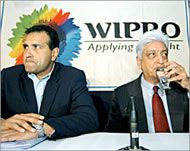Indian firms in global shopping spree
After decades of being stifled by strict foreign exchange controls, corporate India has gone on a shopping spree – snapping up companies everywhere from Britain to Korea.

Still, the country has no home-based takeover tycoons to rival Lakshmi Mittal, the Kolkata-born “king of steel”, whose Rotterdam-headquartered company, Mittal Steel, has mounted a $22.7 billion bid for rival Arcelor.
But with India‘s economy growing at a cracking 8%, the nation’s cash-flush firms are becoming global players, purchasing companies in all sectors from software to
pharmaceuticals, information technology and energy.
While many of the acquisitions are small, that is seen as changing in coming years as Indian companies head increasingly abroad.
Alan Rosling, executive director of Tata Sons, holding firm of tea-to-telecoms Tata group, India‘s second largest conglomerate, said: “We’re really at an exciting time for Indian business.”
He said: “It’s not just the Indian government liberalising (the economy) – it’s the world globalising.”
Well-known brands
Firms in Indian hands include well-known British tea brands, Tetley Tea and Typhoo Tea, the trucking unit of South Korea‘s Daewoo Group and Bermuda-based bandwidth provider, Flag Telecom, whose underseas cables link the world.
Last year, the value of India‘s 118 purchases of foreign firms totalled $2.91 billion, said Marti Subrahmanyam, finance professor at Stern School of Business at New York University. That is around seven times the tally in 2001.
While the amount is small by world standards, analysts say India‘s takeover hunger will rise as firms aim to attain critical mass to compete globally and to leverage their low-cost production base.
 |
|
India’s corporate profile rising |
Mustafa Hamdy, Vienna University of Technology management professor, told a recent Kolkata business forum: “There’s a need for corporates in the developing world to restructure to deal with the compulsions of globalisation.”
India’s biggest deals in 2005 included the $313-million purchase by Matrix Laboratories of Belgium’s DocPharma, TV maker Videocon’s acquisition of the colour picture-tube business of France’s Thomson for $292 million and Tata Chemical’s $112-million takeover of British soda ash manufacturer Brunner Mond.
Its products are used to make glass and detergents.
India‘s burgeoning business process outsourcing (BPO) sector, in particular, is extremely keen on foreign purchases, eager to acquire niche skills swiftly in such areas as retail, insurance or health care.
Alok Mitra, chief financial officer of Mphasis BFL, one of the busiest BPO overseas buyers, said: “We need acquisitions to acquire relevant scale, capability and to plug gaps in service operatings.”
This foreign expansion flurry was impossible until recently.
Indian firms were slow to hit the global acquisition trail because of tight government controls on exporting rupees as foreign reserves were too low.
In 1991, reserves sank to less than a billion dollars, creating a financial crisis that forced India to open its economy to foreigners. Now, thanks to a rush of foreign investment, coffers are brimming at $140 billion and exchange controls have eased.
Dwarfed
The nation’s deal-making, however, is still dwarfed by its giant Chinese neighbours who pay in billions of dollars for acquisitions rather than in millions like India. The average Indian purchase is $30 million which means they do not often hit international headlines.
Also Indian firms have done nothing as high-profile as Chinese computer maker LeNovo’s $1.75-billion purchase of IBM’s PC division which included the world-famous ThinkPad.
In fact, India‘s deal-making in 2005 represented just 1% of total global merger activity valued at $2.1 trillion, according to accounting firm KPMG.
|
“We’re going to see a huge wave and over the next five to seven years you’ll see some firms becoming truly global” Vikram Utamsingh, |
But India‘s global corporate profile is seen rising with business houses like the Tatas, the Aditya Birla Group, drugs heavyweight Ranbaxy, IT giants like Wipro and telecom majors like Bharti Tele-Ventures.
State-run oil giants such as Oil and Natural Gas Corp are scouring the globe for assets to sustain India‘s fuel-import dependent economy.
Vikram Utamsingh, executive director of KPMG India, said: “We’re behind China which started looking at a larger size of ticket item a few years ago but this acquisition drive has only started. We’re going to see a huge wave and over the next five to seven years you’ll see some firms becoming truly global.”
The Tatas’ Rosling believes Indian companies’ managerial skills make them good at takeovers.
He said: “Indian companies are recognised as being very professionally run by world standards.” Also, he added, the diversity of India‘s population makes it good at integrating foreign acquisitions in a sensitive way.